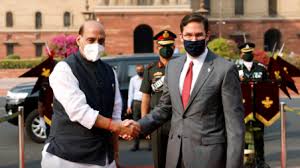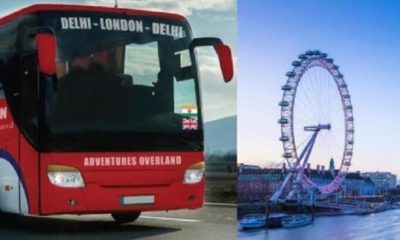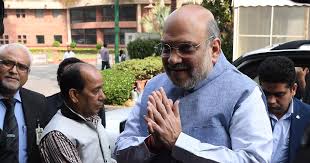National
Highlights of Draft National Civil Aviation Policy 2015

New Delhi: Highlights of the Draft National Civil Aviation Policy 2015 posted on the civil aviation ministry’s website on Friday:
The vision is to create an eco-system to enable 30 crore domestic ticketing by 2022 and 50 crore by 2027.
Enhance regional connectivity through fiscal support and infrastructure development and ease of doing business by simplification of procedures and e-governonance.
Safety violations will be treated with zero-tolerance.
Directorate General of Civil Aviation (DGCA) will strive to create a single-window system for all aviation related transactions, queries and complaints.
The services rendered by DGCA will be fully automated by April 1, 2016.
DGCA will carry out a comprehensive review of all civil aviation requirements (CAR) once every 5 years starting from FY 2016-17.
DGCA will be authorised to impose fines and penalties depending upon the nature of violations. For this, appropriate amendments, wherever required, will be carried out in Acts, Rules and Regulations.
DGCA will be allowed to recruit its personnel directly for posts which are sanctioned as per recruitment rules by exempting them from UPSC for this purpose.
Ministry of Civil Aviation will target an all-inclusive airfare not exceeding Rs.2,500 per passenger, indexed to inflation for a one-hour flight on regional connectivity scheme by: (i) revival of un-served or under-served aerodromes and airstrips. (ii) concessions by different stakeholders: (iii) viability gap funding (VGF) for scheduled commuter airlines (iv) cost-effective security solutions.
Revival of air strips, depending on demand,as no-frills airports will be done at a cost not exceeding Rs.50 crore, mostly through AAI.
Requirement of 12 percent project Internal Rate of Return (IRR) will be relaxed for revival of these airports, wherever the airport is under AAI control.
Regional Connectivity Scheme will be made operational only in those States which reduce VAT on ATF at these airports to 1 percent or less and states to provide free land and multi-modal hinterland connectivity (road, rail, metro, waterways, etc) as required.
To fly abroad government invites discussion on the proposal that airlines to acquire 300 Domestic Flying Credits (DFC) per annum instead of existing five years of flying and a fleet strength of 20 aircrafts.
The government plans to liberalize the regime of bilateral rights leading to greater ease of doing business and wider choice to passengers.
The government will enter into an ‘Open sky’ Air Service Agreement on a reciprocal basis with SAARC countries.
Increase in FDI in airlines from 49 percent to above 50 percent will be examined if the government decides to go in for open skies for countries lying within 5,000 km radius
International codeshare between Indian and foreign carriers will be completely liberalized, subject to the air service agreement (ASA) between India and the relevant country.
To encourage maintenance, repairs and overhaul (MRO) sector in India government proposes to: a) Service Tax on output services of MRO will be zero-rated (b) Aircraft maintenance tools and tool-kits will be exempt from customs duty (c) Foreign MRO experts will be provided visas promptly, especially in cases of an Aircraft on Ground (AOG) situation.
MRO, ground handling, cargo and aviation turbine fuel (ATF) infrastructure colocated at an airport will also get the benefit of ‘infrastructure’ sector, with benefits under Section 80-IA of Income Tax Act.
Separate regulations for helicopters by April 1, 2016
The government will promote the growth of scheduled commuter airline (SCA) for efficient regional connectivity. The eligibility criteria for SCA in terms of paid-up capital will be kept at Rs.2 crore to facilitate easy entry of new players.
The future airport projects in India, both greenfield and brownfield have cost efficient functionality.
Operators of future airport projects will not levy airport charges, concession fee and royalties etc on MRO, cargo, ground handling, ATF infrastructure other than a reasonable lease rental.
Tariff at all future airports will be calculated on a ‘hybrid till’ basis. Thirty percent of non-aeronautical revenue will be used to cross-subsidise aeronautical charges.
Ministry of Civil Aviation and Ministry of Defence to ensure commercial aero-manufacturing is covered under defence off-set requirements.
Government would negotiate with global OEMs to set up an aircraft assembly plant in India.
Ground handling, catering and aircraft fuelling proposed to be included under Essential Services Maintenance Act.
National
Foodman Vishal Singh Honored for Hunger Free World Mission in Bangkok

Lucknow: Vishal Singh, a renowned social worker from Lucknow, also known as Foodman, has once again made India proud. He was honored by the Happy Hands Gloves Cooperative Limited Company in Korathai, Thailand, for his work with the Hunger Free World Mission.
The Hunger Free World Mission’s meeting was held in Korathai, Thailand, under Vishal Singh’s leadership. Representatives from several countries, including Mr. Raja Dwivedi (Managing Director of Happy Hands Gloves Limited), Thailand Coordinator Mr. Raja Mishra, and member Mr. Varun Singh, attended the event.

Under Vishal Singh’s leadership, the attendees took a pledge to work together toward creating a hunger-free world.
Speaking on the occasion, Vishal Singh explained that the main goal of the Hunger Free World Mission is social participation. He said the mission is not just about feeding people but also about meeting other basic needs of those who are struggling. The mission focuses on helping families of terminally ill patients in hospitals by providing food and shelter. It also works to fulfill essential needs like education, jobs, and care for the elderly.
For the last 16 years, the Vijay Sri Foundation has been providing free services, benefiting thousands of people. Vishal Singh highlighted that the mission aims to gain global recognition like other organizations such as WHO, WWF, and Red Cross, which work for social causes.
During this meeting, Vishal Singh was appointed as the Chairman of the Hunger Free World Mission by representatives from various countries. They also discussed holding regular meetings in different countries to push the mission forward.
Business tycoon Dr. Abhishek Verma has also supported this humanitarian mission, vowing to promote the idea of “Seva Parmo Dharma” (Service is the highest duty) worldwide. Vishal Singh praised him, stating that people like Dr .Abhishek Verma inspire others to work for the betterment of society.
Recently, Romania’s Ambassador, Mr . Daniela Sezonov Ţane, invited Vishal Singh to the Romanian Embassy in Delhi, where they discussed the mission in detail. Impressed by his humanitarian work, she honored Vishal Singh and invited him to Romania to take the mission forward .
Food man Vishal Singh has been serving the people of India for the past 16 years. Through the Vijay Sri Foundation, he provides free meals to cancer patients & their families ,shelter, and education for women & children along with running free old-age homes in Lucknow.
In addition to his humanitarian work, Vishal Singh also addresses issues like crime and corruption through his role as Chairman of Seva Path Media and Managing Director of Vijay Sri Foundation.

During the COVID-19 pandemic, Vishal Singh and his team worked tirelessly to provide food and help to the needy, including starving children, elderly citizens, and pregnant women. Despite contracting the virus himself, he continued to assist others after his recovery. He even created a life-saving oxygen regulator using household items, which was praised by doctors both in India and abroad.
In his address at the meeting, Vishal Singh spoke about his mission to create a hunger-free world. He pointed out that India’s large population, along with issues like unemployment and poverty, has caused the country to fall on the Hunger Index. He urged people to contribute just one handful of grains daily to help create a hunger-free world.
He concluded by saying that through social participation, we can empower the people around us, meet their basic needs, and work together to build a stronger, more prosperous, and developed society.























